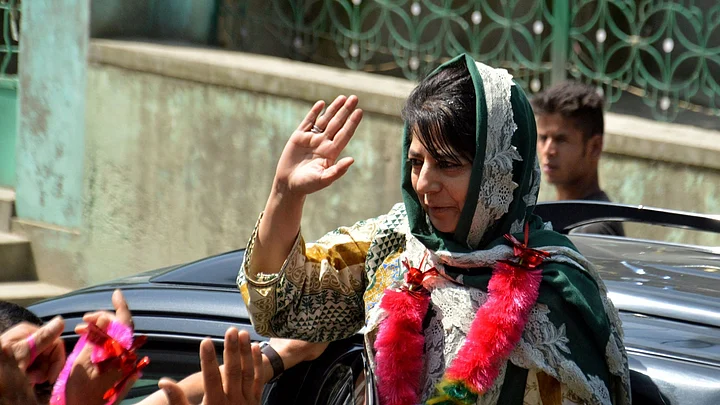Five months into the government, Jammu and Kashmir’s Chief Minister Mehbooba Mufti is sitting on shaky ground. During her maiden press interaction after Hizbul Mujahideen commander Burhan Wani’s killing, the chief minister lost her cool when a journalist confronted her for shifting moral goalposts from her days as the Opposition leader over the deathly cycle of protests and killings in the valley.
Mehbooba’s outburst was not spontaneous. Curfew remains imposed in the Kashmir valley for the eighth consecutive week. Young boys, as old as eight, have taken control of streets and roads normally patrolled by security forces. Government machinery is defunct. All the weapons in the armoury of the state have been tested to bring a semblance of peace, yet the situation on ground has shown little improvement.
Protests and Killings
In its efforts to end the deathly cycle of protests resulting in civilian killings, which is followed by more protests and more killings, authorities in Kashmir have muddied the situation in the valley to the point of (seemingly) no return. On Friday, another civilian was killed by security forces, taking the toll of deceased civilians in the ongoing unrest to 69.
With the separatist leadership refusing to back down from their protest calendars, which has been supported by the trader community as well as the transporters, and no significant announcement forthcoming from the Centre, the resolution of the crisis is nowhere in sight. In all this, Mehbooba Mufti is standing alone on slippery ground and her job is only going to get tougher in coming days.
Shrinking Mainstream
In a symbolic gesture during a recent rally in south Kashmir’s Pulwama district, which has been the epicentre of the prevailing unrest, supporters of the Jammu and Kashmir’s Opposition National Conference and the ruling Peoples Democratic Party headed by Mehbooba denounced mainstream politicians and joined hands to shout anti-India and pro-freedom slogans.
In Anantnag, the home town of the chief minister, Iftikhar Misger, the National Conference’s candidate against Mehbooba in the recently concluded by-poll, quit his party. Omar Abdullah had campaigned in the assembly segment ahead of the elections for Misger, who joined a crowd of protesters early this month, announced his decision to quit mainstream politics and chanted Azadi slogans.
Pandering to the Centre
During the press conference in Srinagar, which was also addressed by the Union Home Minister Rajnath Singh, Mehbooba blamed “five percent” of the population for creating trouble in the Valley. According to reports, central intelligence agencies have also prepared a list of 169 protesters which has been given to the Jammu and Kashmir Police for “immediate action” under the draconian Public Safety Act. Is the Centre calling the shots in Kashmir?
While the chief minister has placed her trust in the Prime Minister Narendra Modi, she has also exposed her vulnerabilities in the process. The BJP, which agreed to start a dialogue with the Hurriyat in its governance agenda with the PDP, hasn’t returned the courtesy yet. If five percent of the population is agitating on the streets, a huge majority is watching the mayhem with concerned silence.
While Mehbooba acknowledges the political nature of the Kashmir problem, she is lost in translation. The chief minister has walked into a trap of semantics which consumed her predecessor. While she has asserted that she will handle the protesters with an ‘iron hand’, will she manage to convince the Centre to also offer a hand of friendship to the Hurriyat?
Engage Hurriyat
The twin visits of Rajnath Singh to Kashmir haven’t brought any hope. Although he didn’t mention the ‘Kashmir as India’s integral part’ theory and spoke about engaging ‘stakeholders’ under the ambit of ‘insaniyat, jumhoriyat and Kashmiriyat’, he stopped short of naming the separatists.
There is little doubt that if anyone holds the key to put an end to the prevailing crisis, it is the Hurriyat. If any offer comes, separatists can’t afford to turn it down at this point in time. There is weariness in the state and, as the Chief Minister herself said, people want a permanent end to the crisis.
While the BJP-led Centre’s policy on Kashmir might be influenced by the upcoming elections in states like Uttar Pradesh, by engaging separatists in a credible process of reconciliation and a subsequent deal on Kashmir, even if it is a temporary arrangement, it will earn a larger victory for India and especially Prime Minister Modi than any election ever will. He should not squander the opportunity knocking at his door.
(At The Quint, we question everything. Play an active role in shaping our journalism by becoming a member today.)
